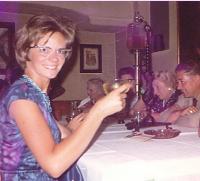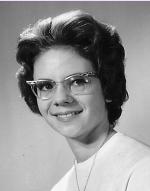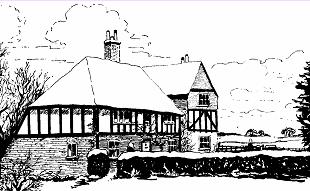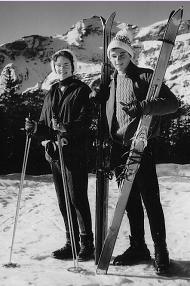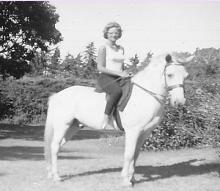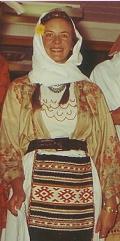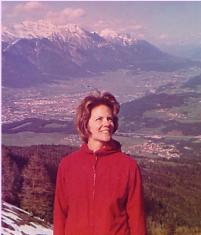My father had had a cousin called Hamilton Thomas Hewson Parkins of Cropthorne Manor in Pershore. His widow, Elsie, died on 6 December 1961, and left my Father some money with which he bought a gem of a little house at Acrise, five miles out of Folkestone. The Mead Cottage had medieval origins with later add-ons. My mother drew this picture from a photograph, adding the snow. What a prophet! In their first winter the snow was several feet thick and they could not get the car out. Dad pulled a toboggan across the field to collect provisions from the village. They suggested I move there with them, but I could not bear to leave Attie alone at Cromdale, and did not want to have to commute 9 miles by car every day. A happy compromise was achieved. I lived at home during the week, and spent the weekends at the Mead. We fetched Attie on Sunday and Dad drove us both back after supper. Mum let me design my own bedroom at the cottage, and I still use the Sanderson curtains half a century later.
Act 2, Scene 1: The career woman
I left School in July 1961 with no clear idea of a career. I had had childhood ambitions of being an air hostess or a TV make-up artist, both of which I eventually sort of achieved in modified form. But I needed a job in order to be financially independent and no longer a drain on the family's funds. My cousin Ann Gordon, three years my senior, worked for the Foreign Office, and I thought that sounded exciting, so I applied and went for an interview. They asked me whether I read the newspapers and I said no as I had been studying hard for A and S-level GCEs. They asked what I thought of General de Gaulle. My reply "As a military man he must be a good leader" must have made it difficult for them to keep a straight face, but they did not show their contempt for this naive bumpkin. I turned down their offer of a job in the Board of Trade, for this did not promise the glamourous life of travel that I had hoped for.
The folkdance group did not want to lose their accordionist, so the husband of its leader looked around locally and found three possibilities: the Dover Harbour Board, a local airport and the travel agency in Bobby's, Folkestone's big department store. I chose the latter as it was easy to get to by bus from Shorncliffe Road and suggested the possibility of travelling. I applied and got it, at just over £7 per week. It was the right decision. This little travel agency was run by three people: the manageress, the typist and me. I went straight onto the counter without training. My first enquiry was about trains to Bromley and I had no idea where it was. But I found the answer, and many more besides, about travel all over the world. I learned to touch-type by copying onto scrap paper copious notes about tourism. Little did I know it, but one day I would earn the highest marks in the country for the Institute of Travel Agents' intermediate examination.
But learning about travel was not the same as doing it. A chance conversation with a young man at a cocktail party gave me an idea. Why not apply to a tour operator to be a resident representative for the summer season? I applied to Inghams, but they could only give me a few weeks' notice, and generously suggested I try Thomas Cook. I went for an interview in Berkeley Street, showed off my Austrian-style German, and got offered a job. Oh dear, it was in Scheveningen, Holland. I politely pointed out that I did not speak Dutch and could they think again? A few days later the offer came -- Grindelwald in Switzerland. YES! I handed in my notice to the little travel agency.
My first attempt at ski-ing was in Wengen, Bernese Oberland, in January 1964. The village had hardly any snow, so we were put on trains to slopes higher up the mountain. Here I made hesitant, bungling attempts but never mastered an elegant stop. A fresh fall came a couple of days before we had to leave, but I was not used to powdery snow and found it heavy going. A lone young man was staying at the hotel and we invited him to join our table. It turned out that he came from South Africa, and his sister was one of my sister Amber's riding pupils.
We took the opportunity of visiting Grindelwald in the neighbouring valley, to see the village and the hotel where I was to be working for Thomas Cook in the summer. The carpark was now an ice-rink, the Alpine meadows were yellow with patches of snow. I introduced myself to the management of the Belvedere Hotel, and my Mother was reassured that I would be in safe and respectable hands.
Switzerland, Summer 1964
How exciting it was, not only to leave home for the first time, but to be living and working abroad for a whole summer! My tiny room at the top of the hotel had a view of the North Wall of the Eiger. Breakfast was croissants and hot chocolate in the garden. Apart from an hour and a half when I had to be available for queries from the holiday-makers, my time was my own, to hike in the mountains, use the chairlift and eat strawberries at the high-level chalet restaurant. The Swiss know how to run hotels, so it was rare to have to sort out a problem, and nothing worse than "If I pay the extra, could I have a view of the Eiger rather than the garden?" The Wagons-Lits Cook office in Interlaken was there if I needed advice. Food and lodging were free, I lived on allowances and commission, while my modest salary was being paid into my account at home, so I had savings when I got back. And when I did get back, my old job at the Travel Agency was offered to me because they had not found a better replacement. I think I did not appreciate at the time how lucky I was. I just assumed that things fell neatly into place like this for everyone!
South Africa, Jan 1965
Accompanied by my parents, this was the first of many visits to South Africa to visit Amber and her family. The pleasure of being there with them was only offset by sunburn and fleabites. We took a cine camera, and filmed like mad. Back at home we made a sound-track on the reel-to-reel tape-recorder, but it was a nightmare to play them in synchronization, because the film projector had a variable speed, so shots of Mum sunbathing would announce "And yet another hippo".
Amber ran a riding school, and put me on a docile horse called Banner. He followed her verbal instructions "Walk on, Banner" more readily than my bungling heel-squeezes. He once startled me by breaking into a gallop, but he never threw me off.
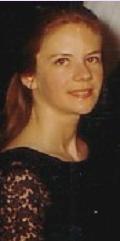
Working in a travel agency offered many perks. The air ticket to South Africa only cost a quarter of the public fare. I went on two free P&O cruises with a small group of other travel agents. One was to Copenhagen and Amsterdam, and here I am at dinner on board trying to look sophisticated in black lace. The other was to Naples, Athens and Lisbon. I dressed as a Greek girl for the on-board fancy-dress competition and won a prize (a pocket dictionary in P&O livery). The dress was a silk dressing-gown, the apron was a pair of woven 'Greek' bags, and the skirt and headscarf were a sheet and towel.
I got so complacent that I turned 'cruises' down. On a banana boat in Southampton some travel agents went on a sea-travel training course. I got top marks in the test ("Which lines go to Valparaiso?" and similar essential knowledge) and was excited to learn that the prize was a free cruise. Details arrived in the post -- a weekend sailing from the Mumbles (near Swansea) to Cork and back. In December. I thanked them but regretted I was not available. It probably clashed with hair-washing day.
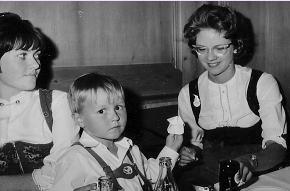
An honorary 'Bavarian', with the Biersack youngsters from a famous family of yodellers.
Thomas Cook sent me for the 1965 summer season to Garmisch- Partenkirchen, between Munich and the Austrian border, at the foot of the Zugspitze, the highest mountain in Germany. I made myself busier here than last year by selecting four nice coach tours and accompanying the English tourists on them every week. They went to the Royal castles and to Oberammergau. The drivers gave a commentary for the German guests, and I translated it into English. By the end of two seasons I probably knew more touristy facts than any of the drivers because I picked up different points from each. I found a zither teacher and got the family to send mine to Innsbruck airport. The customs men would not believe I was bringing a zither into Austria, and I had to unpack it and play it to reassure them.
Escorting Thomas Cook guests to a wine cellar in Innsbruck
Igls in Tirol, Summer 1967
It was a thrill to be asked by Thomas Cook to go to Austria a few weeks early, to travel from place to place and welcome a batch of new Representatives, settle them into their hotels, explain about expenses claims, how to liaise with coach tour companies, to book wine cellars and folklore evenings. Then I had to do the same circuit again and make sure they were happy. I had done the first job so well that they all were and I was able to spend several days with my friend Mitzi in beautiful Salzburg. Finally I jumped on a train to Igls and began my last Alpine summer. This involved a great deal of mountain walking and swimming in the hotel's pool, but also going to Innsbruck railway station and airport regularly to meet the tourists as they arrived, settle them in and explain the facilities.
London, winter 1966/67
After the second summer in Garmisch I wanted to try out living in London. Thomas Cook gave me a temporary job in their Holiday Tours Department. I was on the Italian hotel section, taking bookings from branches and marking off the hotel rooms on big cards, trying to make sure that I did not put two families together in one room. I did double-book once, but somebody sorted it out for me. I rented a room in a hostel in Lancaster Gate, where both my cousin Ann and Steve's wife Jenny had stayed. I shared a room, first with a sensible girl working for Unilever, and then with a crackpot who thought she was connected by telephone wires direct to God.
The Society for International Folk Dancing soon had me playing for them at dances and recording studios. In a large hall at Hugh Mydleton School in Clerkenwell I met Stephen Ward, of Yorkshire stock but almost without the accent -- 'butter' was like us, but 'bath' was like them. He lived in Wimbledon with his parents. He came a'courting, took me for lovely walks on Wimbledon or Ashtead Common, and up Leith Hill or Box Hill.
We had much in common. We both spoke German and had worked for travel agents and as travel representatives abroad, liked the countryside, folk music and dancing. That was a good start, but I soon learned to admire his unshakeable integrity, honesty and moral courage. I was contracted to go to Igls the next summer, but decided to make that the last one and settle in London.
Above Innsbruck, with the Hungerberg mountains in the background.
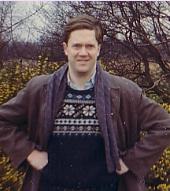
Thomas Cook offered me a full-time job that autumn (1967) as a trainee travel clerk in Mayfair. They assured me they would find temporary accommodation and I went to London not knowing where I would be sleeping, which worried my Mother a lot. The Welfare Department had found me a room in the Church Army Hostel and gave me a day to find something better. I walked into an agency, asked for a bed-sitter, they made one phone call and I had a room in a terraced house in Putney. It was freshly decorated, with a wash basin and a tiny electric cooker.
My parents came to visit me and have a meal. I decided to make zabaglione, for which you have to stand over the pan with an egg-whisk. I had forgotten that the cooker hob was at chest level, and I had to stand on a chair, with my neck bent because of the ceiling, whisking away with more energy than dignity, my parents sitting on the bed looking up at me with astonishment. To everyone's surprise, the result was a great culinary success. Practising the accordion in that little room apparently disturbed the neighbours so I felt I had to move. Stephen Ward, meanwhile, had left his parents because they had moved from Wimbledon to Epsom, and he now rented a flat in Surbiton. He suggested I moved in, so I did. My parents disapproved strongly, and there was an unhappy time when we would not speak, but eventually they saw that lots of other unwedded couples were living together without becoming social outcasts, and they relented and welcomed Stephen into the family.
I loved working as a travel clerk, selling air tickets (made out by hand), cruises and holidays. Among my clients were Lord Denning and Kenneth More. I started in the big booking hall beneath Head Office in Berkeley Street, then to the up-market subsidiary Dean and Dawson in Piccadilly, and thirdly to Cheapside Office in the City. I took two college courses with the Institute of Travel Agents. Stephen had taken them earlier, in fact our first posh date was to their annual dinner-dance at the Waldorf Hotel. He had won a second prize, but I managed to beat him by winning first prize in the Intermediate exam (highest marks in the country) and second prize in the Finals. Thomas Cook were proud of me. It helped that I already spoke German so did not have to attend lessons, freeing up time for other studies: air travel geography, holiday resorts in UK and Europe, British and Continental railway routes, foreign exchange, travel insurance, book-keeping, office design, the law of tort, contract and agency. It was my first and last project as a college student. I worked hard and it paid off. I could add MTAI after my name.
One day an internal advertisement came round for applicants to a post in Management Secretariat at Head Office, a job which served the management suite. They wanted "a young man" --- this was before sexual discrimination laws came in. I applied and got it. I was now back at Berkeley Street working with charming, clever, helpful, amusing men. I was introduced to the managers (Sales, Air, Sea and so on) and learned some life-long skills such as minute-taking and careful letter drafting.
Some time later I found myself part of a small hand-picked team forming a new department concerned with systems design, organisation and methods and the like. We went into Thomas Cook branches to observe the movement of customers around the office, we designed clear and orderly instruction manuals to replace the jumbled manilla folders full of scraps of paper which showed counter clerks how to follow the many office procedures, I got up early to watch what happened to the incoming post and see if security could be improved, I was sent to Hamburg to record the system of getting railway sales data into the Bundesbahn computer, to Paris to re-organise the local office's departments and to South Africa to record the manual accounting system so that it could be computerised. These were probably the most interesting and challenging years of my life and I loved it.
Two suggestions were made which I found flattering: one was that I study and train with the Thomas Cook's Company Secretary with a view to become his assistant, and perhaps later --- who knows? The other was that I apply for the job of Personal Assistant to the Chief Executive. I turned both down as they demanded a higher level of commitment than I was prepared to give, but it was good to be asked.
Then Thomas Cook decided to relocate its Head Office to Peterborough and I did not want to go there. While I was looking for another job, it was suggested I might transfer to the company that then owned the major share of Thomas Cook, namely the Midland Bank, later HSBC. They would halve my house mortgage rate and double my salary, and you don't spend too much time thinking about that. I went into management accountancy, spent my time consolidating budgets for the computer division, and became one of the bank's pioneers in using desktop computers -- another useful skill. However, I felt not quite in place, and finally transferred to the training department and ran first aid courses, having been on a St John Ambulance course held within the bank, joined their St John Division, taken over its leadership and trained to be a first aid trainer. Later I also took on the training of bank recruits by sitting in on the lessons and then having the cheek to teach youngsters what I had just learned. I also set up a resources library for the staff, with books and videos which we issued on demand and recorded the loans on a tiny portable computer. By now I was taking new challenges in my stride.
This went on happily until my late forties, when I was made redundant and was delighted to accept a handsome package allowing me to draw a most generous pension at 50 instead of waiting till 60. So for a year and a half I did free-lance first aid training and an interesting spell at St John Ambulance's national headquarters, until 9 July 1992, when the pension started flowing in and I stopped paid work. It was only the pay that stopped. Work, on the other hand, albeit voluntary, has not stopped from that day to this!



